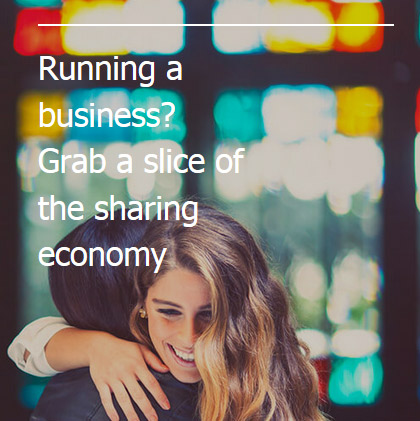
Running a business? Grab a slice of the sharing economy
The sharing economy is rapidly becoming part of everyday life, especially among tech-savvy urbanites who are as comfortable booking an Uber on their smartphone as they are hailing a cab. But you don’t have to be a technology whizz or an inner-city dweller to succeed in the sharing economy, as many small business owners are discovering.
Do you run a small cafe or takeaway? Thanks to new services like Deliveroo, Foodora and UberEATS, your business is no longer confined by four walls. Customers can use an app on their smartphone to order your delicious food from the comfort of their couch. A bike courier or Uber driver will deliver to their home for $5.
We all love to trade, barter, swap and rent, but advances in technology have lifted these age-old transactions to a new level.
This is just one example of the clever ways you may be able to leverage technology to shift your business up a gear.
So what is the sharing economy? It began as a way to connect people with underused assets or skills with people willing to pay for them. We all love to trade, barter, swap and rent, but advances in technology have lifted these age-old transactions to a new level. And created new business opportunities in the process.
In the sharing economy, person to person transactions are facilitated by online platforms, where buyers and sellers can access via their smartphone, tablet or computer. The platform-provider will charge a fee to one or both parties to use the service.
The sky’s the limit
Change has been so rapid it’s hard to believe that accommodation provider, Airbnb, started out as recently as 2008, when two friends came up with the idea of renting out their living room to visiting conference delegates. It’s now valued at around US$13 billion with 25 million users in 34,000 cities globally.According to Roy Morgan Research, 36.6% of Australians aged 25-34 years have heard of Airbnb, and 13.1% would consider using them for their next holiday.[1]
It’s little wonder then that global success stories such as Airbnb and Uber are inspiring local entrepreneurs to have a go.
Sharing platforms allow people to share just about anything, from their car (Car Next Door, Drive My Car), caravan (Camplify, My Caravan), parking space (Parkhound, MonkeyParking) and labour (Airtasker, TaskRabbit) to petcare (Pawshake, DogVacay).
And if the platform that would transform your small business doesn’t exist? Why not hire an app developer and run the idea past some friends to test the market?
Technology is key
Now that broadband services are being rolled out across the nation and close to 90% of adult Australians have a smartphone[ii], the barriers to connecting with your market have never been lower.
Luke Bird is a fly-in fly-out worker based outside Brisbane. With three children and a fourth on the way, he wanted to start his own small business so he could stay closer to home. He saw the Camplify platform as a way to test the market for a camper hire business, Adventure Shack.
Early this year he bought two camper trailers and since then has bought another two, which he hires out to holidaymakers on the Camplify platform. “It allows you to get a feel for the market without having to go all in”, says Bird.
Camplify provides a readymade community of campers as well as contracts and insurance. Like most platforms, it also allows users to rate their experience, which helps people like Bird establish a reputation for good service.
Bird has already moved the business out of his backyard into a commercial warehouse, and if all goes to plan, he hopes to offer up to 20 camper vans, which would allow him to give up his day job.
As the sharing economy evolves and transforms the way we do business, the opportunities to expand into new areas, are only just beginning.
Regulatory challenges
While the sharing economy offers individuals like Bird the opportunity to start a business, the pace of change has caught regulators and lawmakers off guard. Airbnb has faced legal challenges over the terms of its leases and noisy guests[iii], while Uber drivers have had to fight to be covered by insurance[iv].
There is also some confusion around the issue of tax. The ATO recently released guidelines on the sharing economy and tax, which you can read here.
Insurance companies are also beginning to respond to the evolving needs of the sharing economy with new products, especially where assets such as a car or home are used for mixed private and commercial use[v].
As the sharing economy evolves and transforms the way we do business, the opportunities for enterprising individuals to kick-start a business, or for existing businesses to expand into new areas, are only just beginning.
Talk to a Steadfast insurance broker about how you can protect your assets in the sharing economy.
[i] Roy Morgan Research[ii] Budde Comm
[iii] www.smh.com.au/business/property/apartment-dwellers-lose-out-as-airbnb-here-to-stay-court-rules-20160722
[iv] www.brisbanetimes.com.au/queensland/queensland-uber-review-racq-pressures-government-20160731
[v] ACCC 2015, p.14.




